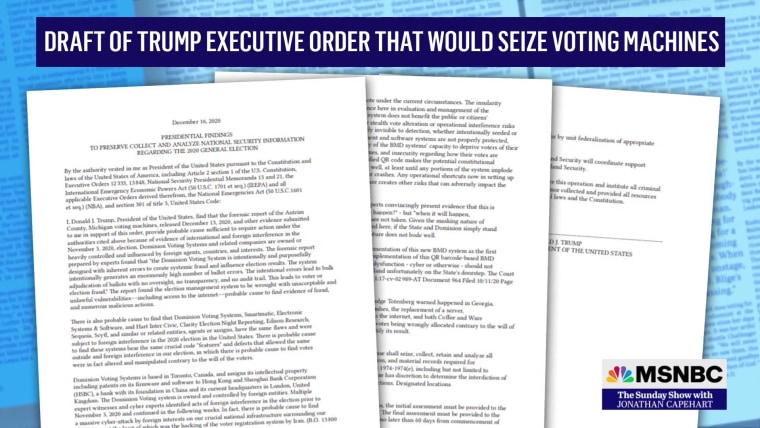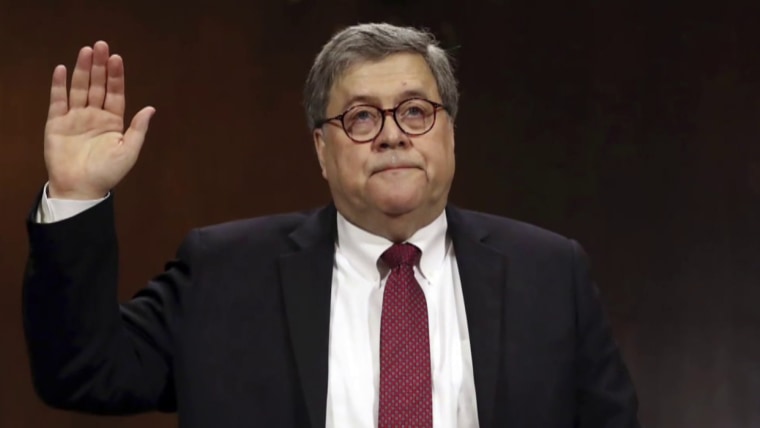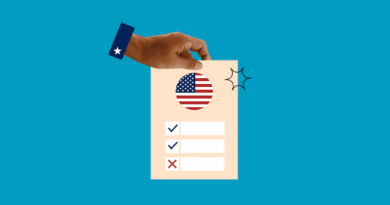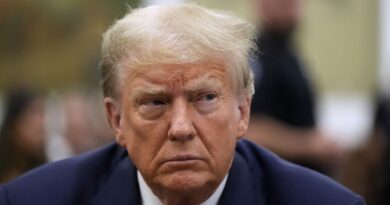Trump didn’t sign this newly unearthed 2020 election EO. We need to know why.
Civilian control of the military is an essential element of our government, designed to ensure that the military reflects the will of the people. The Founding Fathers, concerned that a strong unitary executive could co-opt the military, divided that control between the executive and legislative branches.
That foundation ensures we have a system in which the military doesn’t interfere in domestic politics. The Posse Comitatus Act firmly limits the ability of the military to engage in law enforcement activity on domestic soil. And the military is strictly prohibited from interfering in elections — there are criminal penalties if any member of the military tries to intimidate people to stop them from exercising their right to vote or interferes in the counting of votes.
The draft executive order that the House Jan. 6 committee obtained last week was a stunning departure from American tradition.
So the draft executive order that the House Jan. 6 committee obtained last week, dated Dec. 16, 2020, and prepared for former President Donald Trump’s signature, was a stunning departure from American tradition. According to Politico, which first reported on the document, it was among the White House materials Trump’s lawyers fought hard to keep private. Last week, the Supreme Court rejected Trump’s appeal.
The draft EO is titled “PRESIDENTIAL FINDINGS TO PRESERVE COLLECT AND ANALYZE NATIONAL SECURITY INFORMATION REGARDING THE 2020 GENERAL ELECTION.” It rehashes the gobbledygook of Trump’s election fraud “big lie” as justification for directing the secretary of defense to seize, retain and analyze “all [voting] machines, equipment, electronically stored information.” It orders the secretary of defense to deliver an initial assessment of the election to the president seven days after the seizures.
We don’t yet know the full story behind the EO. We don’t know who was involved in writing it (although some pundits have opined that the use of the word “she” describing plans for a special counsel suggests that now-disgraced Trump lawyer Sidney Powell was involved) and whether it received serious consideration. Trump never signed it, despite other dogged efforts to try to recapture a lost election. Were there residual guardrails that held? People who pointed out that the order was unconstitutional and an affront to democracy?
These questions highlight the importance of the Jan. 6 committee’s work.
On Jan 3, 2021, the 10 living former secretaries of defense wrote in The Washington Post that “American elections and the peaceful transfers of power that result are hallmarks of our democracy.” They admonished that “there’s no role for the U.S. military in determining the outcome of a U.S. election” and that “[c]ivilian and military officials who direct or carry out such measures would be accountable, including potentially facing criminal penalties, for the grave consequences of their actions on our republic.” While they were speaking to the country, they singled out one person by name: the newly appointed acting secretary of defense. In hindsight, and with knowledge of the draft executive order, their comments are even more chilling.
Acting Defense Secretary Christopher C. Miller, a former special forces member, worked as a special assistant to Trump and in various other capacities before he was appointed to serve at the Pentagon on Nov. 7, 2020, four days after the election. Trump had already lost. What reason could there be to replace a secretary of defense so late in the game? Sen. Angus King, I-Maine, spoke for many critics when he noted that bringing someone who lacked experience at the secretary level on board “during the presidential transition is a dangerous action which makes no sense.”
Miller wasn’t the only red flag. Trump installed another loyalist, Kash Patel, as Pentagon chief of staff after the election.
But Miller wasn’t the only red flag. Trump installed another loyalist, Kash Patel, as Pentagon chief of staff after the election. Patel was put in charge of running the Defense Department’s transition just two weeks after he assumed his new role. According to an NBC News source at the Pentagon, Patel “told everybody we’re not going to cooperate with the transition team.” Three other people, characterized in news reports as Trump loyalists, also took over important posts at the Pentagon, handling policy, intelligence and security — again after the election.
The guardrails were collapsing at a key moment. It’s no wonder the former secretaries of defense decided to publicly remind their acting successor of his obligations. On the military side of the equation, Gen. Mark Milley, the head of the Joint Chiefs of Staff, made his stance crystal clear. “If there’s a disputed election, that’ll be handled by Congress and the courts,” he said. Milley, who had wandered into a political quagmire of his own after he appeared in uniform during Trump’s Lafayette Square photo op, had no trouble drawing a clear line for the military here. “There’s no role for the U.S. military in determining the outcome of a U.S. election. Zero. There is no role there.”
How widely did the draft EO circulate? We don’t know for certain. But on Dec. 21, 2020, outgoing Attorney General William Barr publicly announced that there was no need for the federal government to seize voting machines or to appoint a special counsel, another provision in the draft executive order. Barr resigned two days later, explaining that he wanted to spend more time with his family — just a few days before the Christmas holiday and with less than a month to go before the end of the administration.
The chair of the Jan. 6 committee, Rep. Bennie Thompson, D-Miss., says the committee has additional questions for the former attorney general now that they’ve learned of the plan to seize voting machines and “utilize Department of Defense assets.” The timing suggests that Barr could have been aware of the draft EO or the plan behind it. He specifically rejected the notion of seizing voting machines days before he resigned. If he did know, he failed to make his concerns public, even during the second Trump impeachment. He owes the American people the truth, under oath, even at this late date.
The country is very fortunate that the EO never went into effect. It isn’t a piece of constitutional scholarship, and the courts would likely have invalidated it. But litigation takes time, and the country was running out of it. Trump could have used a report casting doubt on the election as ammunition to declare it invalid. It’s not beyond the realm of possibility that there could have been an attempt to invoke the Insurrection Act and interfere directly with the transfer of power.
Now, Congress must be permitted to complete its investigation; any laws necessary to prevent a re-occurrence and restore the balance of power must be considered. The draft EO may ultimately be the tip of the iceberg. And the Justice Department must not ignore the evidence the committee is compiling.
It’s not beyond the realm of possibility that there could have been an attempt to invoke the Insurrection Act and interfere directly with the transfer of power.
We must not become a banana republic that routinely prosecutes former leaders. But if there is evidence — not just speculation — of intent and efforts to advance the draft order and use it to overturn the will of the people, then this is far from routine. The EO suggests that a group of people was hard at work on plans to use the Pentagon to disrupt the peaceful transfer of power. It took high-level insight to craft those plans and potentially put people in place to implement them. If evidence confirms a conspiracy, those involved, however high up, merit prosecution.
The key to a conspiracy investigation is determining who entered into an agreement and what they intended to accomplish. The existence of a draft EO doesn’t inherently prove that Trump or anyone else entered into an illegal conspiracy. But it does validate the fears of many reasonable officials and watchdogs who were worried about behind-the-scenes scheming before and after the election. And it raises questions that must be answered about who thought it was a good idea to use the military, in violation of basic principles, to interfere on behalf of a candidate who lost an election. The truth cannot stay covered up.




